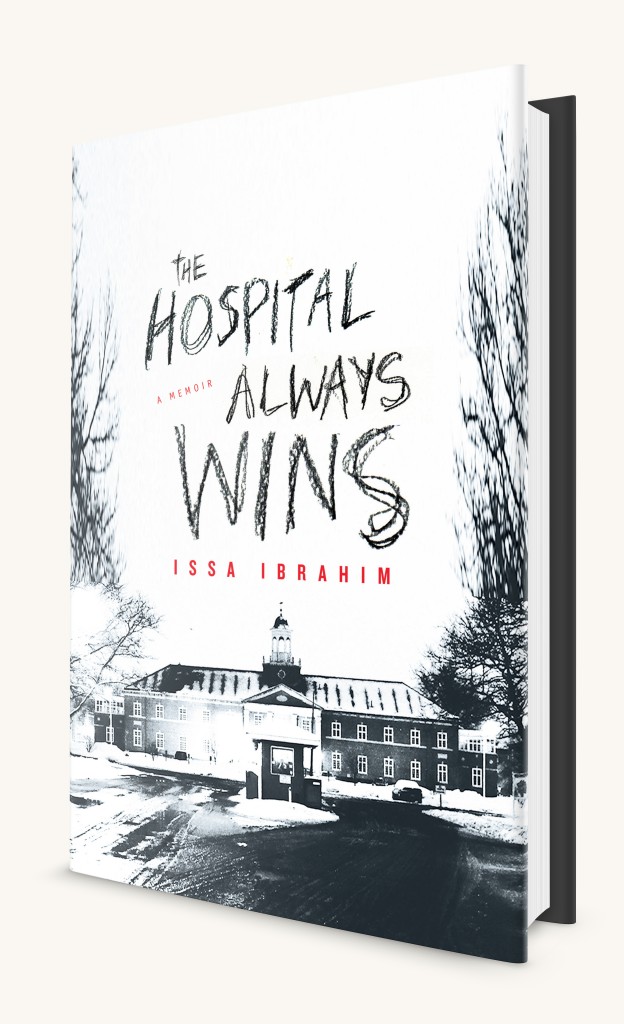 In his searing new memoir, The Hospital Always Wins, Issa Ibrahim talks candidly about his development of severe mental illness leading to the accidental killing of his mother, his subsequent commission to Creedmoor, a mental hospital in Queens, New York, and the episodes that occurred within its walls—some that helped him heal, others that prevented him from leaving. To avoid the monotony of life in the hospital, Issa turned to the catharsis of painting, and its ability to express feelings he could not otherwise articulate. Today, Issa’s paintings are exhibited throughout the world for their dark beauty and distressing subject matter.
In his searing new memoir, The Hospital Always Wins, Issa Ibrahim talks candidly about his development of severe mental illness leading to the accidental killing of his mother, his subsequent commission to Creedmoor, a mental hospital in Queens, New York, and the episodes that occurred within its walls—some that helped him heal, others that prevented him from leaving. To avoid the monotony of life in the hospital, Issa turned to the catharsis of painting, and its ability to express feelings he could not otherwise articulate. Today, Issa’s paintings are exhibited throughout the world for their dark beauty and distressing subject matter.
Here he discusses how he came to write about his 20 years in a mental institution, his relationship with his mother, and how he ultimately forgave himself and learned to heal.
How did the writing of your story come about?
After the tragedy, my psychotic break and my Mom’s accidental death, I ended up in a hospital’s Criminal Psychiatric Unit, to be evaluated and deemed competent to stand trial for the offense. One of the few people who would still see me heard my story and brought a note pad, telling me to write it down. That note pad grew to stacks of composition notebooks, which later were transposed onto floppy disks when I acquired a laptop. I kept writing to process the experience, understand myself and know fully what happened.
What was your childhood like?
Seemingly perfect. The family unit was intact, loving, and supportive. We lived in a house with a big backyard in a decent neighborhood. It wasn’t until I grew older that I saw the seams, the cracks, the decay. The parental missteps, marijuana abuse, philandering, familial dysfunction, and it just seemed to magnify as time went on. But my childhood, my formative years, growing up in a home inundated with art and music and creativity was wonderful. I wouldn’t change it at all.
What was your relationship with your mom?
We loved each other. I was her favorite and I adored her. I soaked up all of her likes, interests and influences, adopting her love of media and popular culture. Her influence in my life as an artist is immeasurable. The love I feel for her is immense, and the love that she had for me still resonates, and gives me strength, allows me to go on. I’m doing this for the both of us—for her and for myself, because I know she would just love for her baby son to have survived such a traumatic event and lived to write about it, and sing about it, and paint it.
How did marijuana play a part in your story?
I came from an artsy, Bohemian environment and pot was everywhere. I avoided it all my life because I was aware that it was illegal. I also felt uneasy at home because I noticed my family, my parents were always high and out of proper contact with me. I couldn’t articulate this at the time but I felt it. It wasn’t until my Dad died of cancer when I was 22, and I was vulnerable, grief stricken and fragile, that I started smoking. I totally understood and continue to understand why people turn to it. It’s a seemingly harmless way to cope or escape reality and responsibility for a little while. Except, for me (and others), it’s not so harmless.
Did you try to seek help?
Yes. In 1989 I was telling my friends that I was having a problem with marijuana and that I believed it was affecting me mentally. I quit my job in NYC and flew out to California to stay with my older sister, who was a nurse. But being an avid marijuana smoker she minimized the issue. She chose not to or didn’t know how to help me. When I told my mother, her solution was to rub healing oil on my head. I look at it like the butterfly effect that never happened: if one thing had been different, maybe things would not have taken the tragic turn that they did. But I guess we’ll never know.
Why did you decide to accept the insanity plea?
It was an option that my attorney and the Queens DA suggested and I went with. I really wanted to know what had happened to me, and to prevent it from happening again. I also did not want to go to prison. The insanity plea is an indefinite sentence, and though I would’ve probably done less time had I copped a plea and gone to prison, I fear the type of person I would’ve become had I done that. Taking the insanity plea gives me a psych history but I do not have a criminal record, which means a lot to me. Though I did not get the best care and treatment in the mental health system I tried my best and succeeded on my own in developing a deeper understanding of my addiction and my mental health.
How is your relationship with your family now?
Not good. They’re still grieving. Not only have they tragically lost their mother but they also lost a brother. It’s hard for them, and I totally understand their pain and anger. If the roles were reversed and I were as ignorant to mental illness as I was before I got sick I’m sure I’d be angry as they are. I wrote this book to understand what happened to me and to perhaps help others understand mental illness. If in some way it gives my family closure, I would be grateful and relieved.
How did you survive addiction, insanity, the trauma and tragedy of your mother’s death and 20 years institutionalized?
 It’s been difficult for me, wrestling with intense guilt and remorse, compounded by my family’s abandonment. To borrow a phrase from AA, I hit rock bottom, and once I realized that’s where I was I knew there was nowhere else to go but up. I embraced positivity. I never gave up hope. One thing I’ve discovered is human beings are very resourceful and adaptable creatures. You’ll be surprised what you can survive.
It’s been difficult for me, wrestling with intense guilt and remorse, compounded by my family’s abandonment. To borrow a phrase from AA, I hit rock bottom, and once I realized that’s where I was I knew there was nowhere else to go but up. I embraced positivity. I never gave up hope. One thing I’ve discovered is human beings are very resourceful and adaptable creatures. You’ll be surprised what you can survive.
What would you say to your mom if she were alive right now?
Thank you, for loving me and imbuing me with the talent that allowed me to see the world differently. Mom instilled in me a love of the arts and the ability to see harsh realities and then subvert it, spin it, make it funny, tolerable, if for no one else but myself. That’s what helped me and continues to help me survive. So I thank Mom for that. And I will always love her with all my heart.
What do you want people who become aware of your story to come away with?
Seek help. If you feel you’re in crisis mentally you probably are. And don’t give up hope. Writing, then reading the first few pages of my journal gave me understanding and peace. So I kept writing, and then painting again, and then making music. I did whatever I could do to ease my mind and soothe my soul, just as my mom taught me when I was a child. There is hope and healing in creativity for me and, I believe, for others too.
-Caitlin Eck
The Hospital Always Wins: A Memoir by Issa Ibrahim officially publishes on June 1, 2016. It’s available where books and e-books are sold.
No Comments
No comments yet.